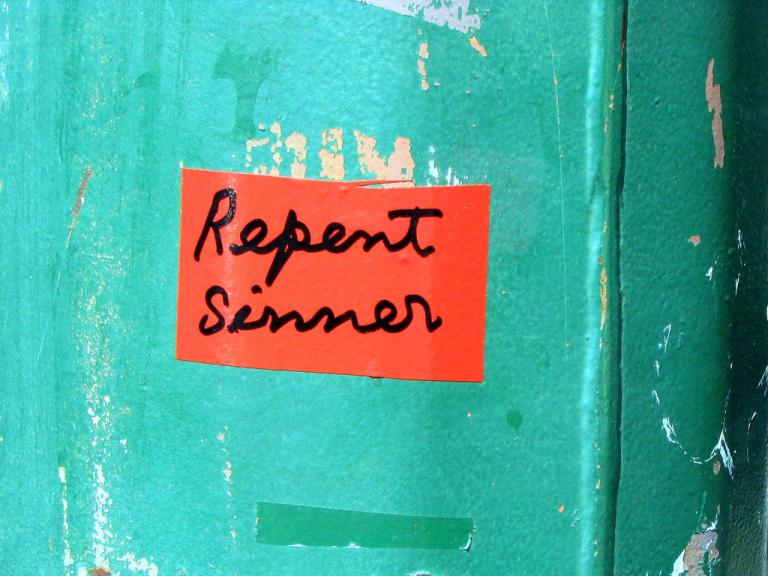(H/T)
Have you ever seen The Mission?
If you haven’t, you really should.
It’s a fantastic film starring two of the greatest actors of their generation – Robert De Niro and Jeremy Irons – as a priest and conquistador trying to navigate the turbulent waters of the New World.
In one of the most iconic scenes of the film, De Niro – the conquistador – is following Irons and his fellow priests through the jungle while lugging his obscenely heavy armor on his back. It’s an act of penance, intended not just to repair the damage caused by the sin he committed, but to demonstrate his genuine repentance.
As we see De Niro covered in mud and struggling to stand under the weight of his past, we are left with conflicting feelings of “enough is enough” and “this is a man truly sorry for his sins.”
It’s a moving scene that beautifully captures the costliness of repentance.
Penance is, of course, an ancient sacrament in the Roman Catholic Church, but was essentially done away with by the Protestant Reformers in their fervor for all things “by faith alone.”
Today, the cost of repentance is even cheaper.
Repentance, like salvation found in a moment at an altar call, can be had instantaneously for a few magic words. Say the right thing – or have your PR guy craft the right apology for you – and Christians everywhere are expected to offer you instant absolution, no questions asked. Any concrete actions on your part to demonstrate a truly contrite heart and desire to follow a new path are not only not expected, but calling for such action is considered almost non-Christian because it seems to run counter to our faith alone gospel.
Unfortunately, the people in power who seem to so often find themselves in this sort of situation have grown wise to the deal we’ve created. They know how to work the system. They know that if they just say the right thing and go through a few simple the motions, they can essentially continue on doing what they’ve been doing in the same way they’ve been doing it for as long as they want.
All the while, we pat ourselves on the back for our forgiving hearts while shaming our brothers and sisters who are more skeptical of someone whose repentance seems to be completely exhausted by their words.
The underlying problem, I think, is that we’ve divorced forgiveness from accountability.
We’ve fallen in love with terrible theology that talks about God forgetting our sinful past and so we come to believe that we’re somehow being holy if we essentially act as if nothing has happened in the past the moment a powerful leader issues a public statement of repentance.
It’s almost as if not holding each other accountable for the terrible things we do is some sort of Christian virtue.
But the truth is there is nothing virtuous or Christian in acting just as if they never sinned (a common, but, again, terrible understanding of justification). Our actions have consequences. And while we may no longer face eternal consequences for our sin because of Jesus, the earthly consequences are very real and aren’t going anywhere.
Which is why forgiveness divorced from accountability is so dangerous.
For when we refuse to hold one another accountable to walking the costly path of repentance, we not only dishonor the pain of victims, we become enablers of the abuser.
When repentance and forgiveness become formulaic, requiring little more than a few magic words, then those who pervert their power will almost always work the system in order to maintain control over the kingdom they have created.
While this may have become normal and expected, it should go without saying that this is not the path of Christian discipleship.
If new lives and a new world – Thy kingdom come on earth as it is in heaven – are things we truly seek, then we can’t just pay lip service to them. We must actively seek them out though our actions and we must be willing to pay the cost along the way.
Repentance comes with a cost.
The cost of repentance isn’t dragging old armor through the jungle. It’s the pain of abandoning the kingdoms we’ve created for ourselves, the awkwardness of seeking forgiveness from those we’ve hurt, the toil of making restitution, and the struggle of forging a new way of living.
If people repent, we should absolutely offer them forgiveness, even if they are celebrity pastors who make our skin crawl.
But if in our forgiveness we do not hold our brothers and sisters accountable to their penitent words when nothing in their lives changes, then our forgiveness is just as big of a sham as their repentance.
And perhaps even more dangerous.













